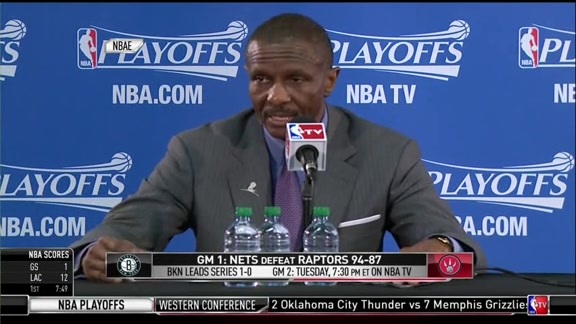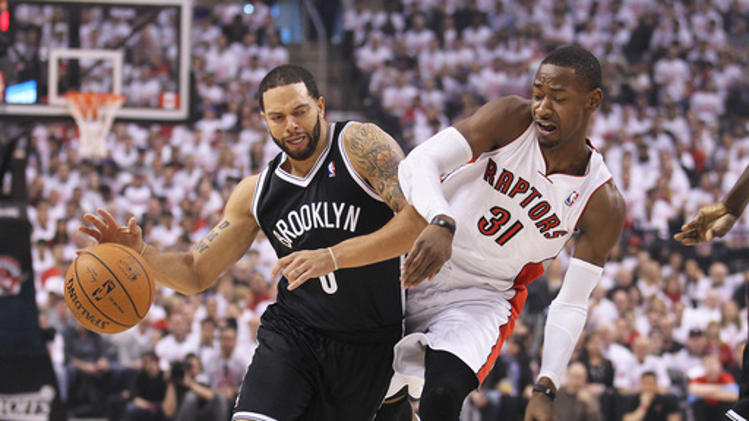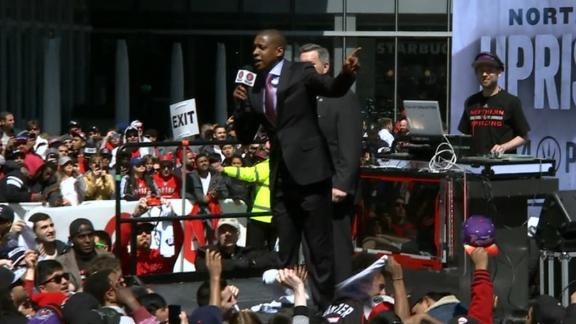In the wake of Toronto’s uninspiring outing in game one of their series against the Brooklyn Nets on Saturday, all of the talk post-game dealt with either the players on the court or the executive that put them together. Some wanted to talk about the disappearance of DeMar and Amir, others the emergence of Valanciunas and everyone wanted to chime in on the Masai Ujiri f-bomb delivered moments before tip-off. No one, though, seemed all that interested in talking about head coach Dwane Casey — odd considering that the Playoffs often come down to the game of chess that occurs between the two men calling the shots from either sideline.
This is Dwane Casey’s first crack at being the man in change for a Playoff series. While he’s been to eleven postseasons as an assistant in Seattle and Dallas, that experience aiding someone else — while useful — can only carry you so far in a series where you’re responsible for designing a winning game plan yourself. Casey wasn’t really out-coached in game one, in fact his team probably would have won if they’d been able to take care of the ball better (the club had 19 turnovers leading to 17 Brooklyn points). The Raptors out-rebounded the Nets pretty easily (45 to 37) and they out-assisted them, too (22 to 16). The Raptors hit more free throws (23 to 22) despite Toronto’s need for late-game fouling and they scored four more points on the break.
All that and the Raptors held Brooklyn to just 42.5% shooting on the game, which is below their top-ten regular season field goal percentage of 46%.
So all of that should be a reason for optimism, right? The Raptors did a lot right and lost because of a couple of correctable errors: DeMar DeRozan’s 3-13 stinker and an overabundance of turnovers. Bring on game two.
Well, not so fast. Remember, the chess match of the Playoffs cuts both ways. Jason Kidd got a forty-eight minute look at how the Raptors plan on executing against his club. He saw how they planned on handling the awkward matchup at power forward between Amir Johnson and Paul Pierce, he saw how they had success with Valanciunas down low and when they got out in transition. Tuesday isn’t just going to be a case of Dwane Casey fixing a few problems and otherwise rolling out the same strategy, it’s about tweaking what needs tweaking while also realizing that Kidd and the Nets are going to be spending their downtime working to upset those same things that Toronto did well in an attempt to take a suffocating 2-0 lead in the series before heading back to New York.
- Also on RR: Tim Chisholm and Andrew Thompson join Zarar on the Raptors Weekly Podcast, April 21 – Response Required
This is where we really get to see Casey The Tactician work. Casey has logged a lot more bench time than Kidd has. He’s been in the coach’s room not just conceiving strategies for his troops but also theorizing on the counterstrategies that his opponents are going to use. Yes, there is a big difference between offering a voice in that conversation versus having to make the final call, but if one of the key story lines to this series is going to be experience then Casey’s experience has to count for something here.
Let’s remember, Casey has a lot riding on these Playoffs. He’s a free agent at the end of this season. While it would appear to be a no-brainer that he returns next season after putting together two remarkable seasons out of his three since arriving in Toronto, you learn to never count your chickens as a head coach, especially when you were inherited by the general manager. If he is thoroughly out-strategized in this postseason it at least has to give Ujiri pause before he restructures the roster to better suit Casey’s preferred style of play. No matter what, this roster is getting a tune-up this summer, and it may not be a subtle one. Ujiri has to know what kind of players he’s going out and looking for. If he starts to have doubts about the kind of system that Casey wants to run (or his ability to get his players to run it consistently and effectively) then this summer would be the time to make that change, regardless of how impressive Casey was in the regular season. We’re in an age of zero security for head coaches. Casey’s not unaware of this, and while he would never coach from a position of trying to save or secure his job, there are potential implications hanging on his decisions that extend beyond his chess match with Kidd.
It’s one of the reasons why watching how Casey reacts from game-to-game is the most interesting aspect of his postseason for me. We’ve never seen Casey in this mode before. We never seen how he responds to the adjustment game that the Playoffs force a coach to play. He says he’s coming armed with more plays for Valanciunas, a re-conceived attack for DeRozan and more running overall. Great. Those sound like worthwhile strategies to implement, but there are miles and miles between those concepts and how they can, will and should be executed in a competitive Playoff series. Does he have the tactical wherewithal to implement these alterations to his game plan? Does he have the motivational chops to get his players to execute it? Will he abandon certain principles mid-game if they aren’t working? Will he alter his rotations for the same reason? He took the first blow in this series and so these are the questions that now lie at his feet. How he responds will have trickle-down affects that linger long after this series is over. Ujiri and Tim Leiweke want to build a contender, and contenders contend in the postseason, not the regular season. Even if Casey can’t win this series (and the personnel he has to work with may dictate that outcome for him) he nonetheless has to demonstrate to his bosses that given the right personnel he can make a team successful in the Playoffs.
First, though, he has to make his next move on the board and win game two, because if he doesn’t his team won’t survive long enough to get any satisfying answers to the aforementioned questions.



